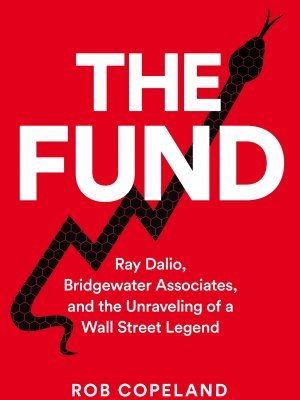The Fund: Ray Dalio, Bridgewater Associates, and the Unraveling of a Wall Street Legend
Rob Copeland
Pan Macmillan – R399
The Salem Witch Trials of 1692 are not the first things that should come to mind when reading the biography of the founder of one of the world’s biggest and most successful hedge funds. Yet, as I read Rob Copeland’s book about Ray Dalio and his firm, Bridgewater Associates, those 330-year-old ghosts seemed to hover above almost every page.
Dalio, a billionaire several times over, founded Bridgewater in the 1970s. By the 90s, it had become enormously successful and was, for a time, the biggest hedge fund in the world. But as it grew, according to Copeland, an award-winning journalist with The New York Times, so did Dalio’s obsession with codifying his management methodologies. These were set down in a rambling document called ‘The Principles’, which all employees of Bridgewater were required to read, learn by heart, and quote from extensively at every given opportunity.
Under the guise of an obsession with ‘radical truth’ and ‘radical transparency’, Dalio also launched a company-wide system of scoring – the ‘dot-count’ - whereby employees could rank each other on performance and behaviour. Needless to say, this supposedly egalitarian process was fatally flawed: when Dalio himself rated someone highly, everyone else followed suit, and vice versa.
A low ‘dot-count’, often as a result of failing to adhere to one or other of ‘The Principles’, would almost certainly result in a public trial, usually conducted in front of hundreds of staff members and often led by Dalio himself. It will come as no surprise to learn that such trials often resulted in the individual being drastically demoted or fired. Every trial was also recorded on video and uploaded to something called a ‘Transparency Library’. New hires to Bridgewater were required to study these videos.
In 2010, details of ‘The Principles’ and their application were leaked to the media, but by that point, Bridgewater’s performance as a hedge fund had begun to slip. As that happened, Copeland’s account suggests that Dalio’s obsession with ‘The Principles’ rose in almost inverse proportion.
As I read the book, the ghosts of Salem were joined by others from the 1950s McCarthy-era anti-communism hearings in America and many from the show trials of Stalin’s Soviet Union. I was not surprised to learn that quite late in the process, a new corporate attorney at Bridgewater pointed out that much of what had been going on was completely illegal, even in terms of the US’s notoriously harsh labour legislation. The video library of humiliated, weeping executives suddenly disappeared.
Dalio, edging into retirement, has taken it a stage further. He has turned his manifesto into a book, Principles – Life and Work, which topped The New York Times’ bestseller list.
Despite his commitment to ‘radical truth’ and ‘radical transparency’, however, he refused to be interviewed by Copeland for the book, and even hired as many as three law firms to try to prevent its publication. Happily for the reader, he failed and the result is an engrossing account of how not to run a company, despite its enormous financial success.
(For the record, and as Copeland makes clear throughout, Dalio has read The Fund and disputes many of its assertions, either through lawyers or through company spokespeople.)
We Need To Talk About Inflation
Stephen D. King
Yale – R480
In any great horror movie, there’s always that special moment when the protagonist sits back and breathes a sigh of relief. The monster has been tamed, danger averted, and we can all relax. If only that were true! Regular audiences know that this is the cue for the creature to come crashing back onto the screen, bigger, more dangerous, and more terrifying than ever.
So it is with the economic nightmare we call inflation. Author Stephen D. King himself draws the parallel with Arnold Schwarzenegger’s Terminator: “I’ll be back!” Like the movies, just when central bankers and politicians are congratulating themselves that inflation has finally been beaten, once and for all, it comes lurching out of the night, causing financial pain to whatever it touches.
King knows his subject: he is senior economic adviser at HSBC, a columnist for London’s Evening Standard newspaper, and has also been a specialist adviser to the UK’s House of Commons Treasury Committee. Happily, he writes elegantly and easily, which allows us an accessible approach to a central but potentially very dry issue in modern economics: why does inflation keep reappearing and what do we have to do to bring it under control?
In fact, ‘modern economics’ is a misnomer. King begins by tracing the history of inflation back to Roman times, nearly 2 000 years ago. He follows its course to today, touching on the effect of Spanish gold brought to Europe by the Conquistadors, Henry VIII’s dissolution of England’s monasteries and many instances of rulers of the Middle Ages debasing the precious metal content of their coinage. The assignats of the French Revolution make an appearance, as do the Napoleonic wars, and much more.
King’s purpose, however, is demonstrate the clear and firm relationship between government spending – the fiscal side of the equation – and monetary policy. How much money is in supply (called M2 in America and M3 in Europe, the UK, and South Africa) and the effect interest rates have on how people spend that money.
In years gone by, interest rates were set by the markets. Now they’re a function of central banks, but King is very much of the opinion that central bankers have fallen asleep at the wheel, believing that because inflation has been absent for so many years in most major economies, it has been permanently vanquished.
This, he suggests, has allowed central banks to take on responsibilities other than purely maintaining price stability via inflation control. He cites the European Central Bank as an example, defending the euro and supporting eurozone countries in financial difficulty.
Nor is it just the Europeans: many governments around the world have resorted to post-pandemic quantitative easing, whereby their central banks buy huge amounts of government debt. This, King maintains, is inflationary because it’s a form of printing money and causes a rapid increase in the money supply.
He ends the book with 14 lessons from which we can all learn, but they should be taken to heart by central bankers and politicians, especially those in charge of the fiscus. In the briefest of summaries, his key point is that monetary policy must regain the upper hand against its fiscal counterpart; when politicians overspend, which they always do, a truly independent central banks needs to have the mandate and the means – sharp teeth in the form of interest rates – to snap back and halt the rot. Otherwise inflation will once again stagger from the dark undergrowth, wreaking havoc in its wake.






